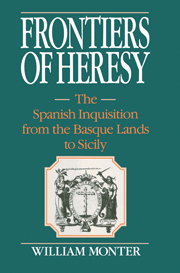Book contents
- Frontmatter
- Contents
- List of maps and figure
- List of tables
- Preface
- PART 1 THE HOLY OFFICE OUTSIDE CASTILE
- PART 2 ARAGONESE TRIBUNALS
- PART 3 ARAGONESE HERESIES
- 9 Patterns of Morisco persecution in northern Spain
- 10 The survival of Morisco culture in Aragon
- 11 Protestants, Frenchmen, and toleration
- PART 4 “MIXED CRIMES” IN ARAGON
- PART 5 RECESSIONAL
- APPENDICES
- Glossary
- Index
- CAMBRIDGE STUDIES IN EARLY MODERN HISTORY
11 - Protestants, Frenchmen, and toleration
Published online by Cambridge University Press: 24 October 2009
- Frontmatter
- Contents
- List of maps and figure
- List of tables
- Preface
- PART 1 THE HOLY OFFICE OUTSIDE CASTILE
- PART 2 ARAGONESE TRIBUNALS
- PART 3 ARAGONESE HERESIES
- 9 Patterns of Morisco persecution in northern Spain
- 10 The survival of Morisco culture in Aragon
- 11 Protestants, Frenchmen, and toleration
- PART 4 “MIXED CRIMES” IN ARAGON
- PART 5 RECESSIONAL
- APPENDICES
- Glossary
- Index
- CAMBRIDGE STUDIES IN EARLY MODERN HISTORY
Summary
Se va esteniendo esta macula luterana, de la qual sentimos que esta algo tocanda la nacion francesa.
Saragossa to Suprema, 1546 (Archivo General de Simancas, Patronato Real, Legajo 28, p. 56).Calificose este hecho, que attenta que eran franceses, parecia sospechosissima de heregia.
Barcelona relatión, 1576 (Inq., Libro 730, fol. 197v).Con las franceses habeis de hacer llanamente justicia, sin atender el capitulo de los paces.
Suprema to Santiago, 1618 (Contreras, Galicia, pp. 623–24).On May 23, 1563, a vengeful French Dominican named Fray Jacques Alberti made a lengthy denunciation of his compatriots before a comisario of the Inquisition in Madrid. He began, not uncommonly for key witnesses, by sketching his own biography. Born about 1532 at Carcasonne in Languedoc, he had become a lay brother of St. Dominic at their Montpellier convent around 1549. Except for three years at the convent of St. Maximin in Toulouse, he had lived quietly in his home convent until the Wars of Religion erupted in Montpellier. (Although surrounded by members of a great teaching order, Alberti was illiterate and could only mark his deposition with a cross.) About a year ago, he continued, his convent was sacked, its custodian killed, and he had fallen into the hands of the Huguenots. Seven monks captured with him were martyred because they refused to convert or to tell where the body of St. Roch and its accompanying treasures were hidden. Alberti had saved his life by revealing the location of a few minor decorations.
- Type
- Chapter
- Information
- Frontiers of HeresyThe Spanish Inquisition from the Basque Lands to Sicily, pp. 231 - 252Publisher: Cambridge University PressPrint publication year: 1990



